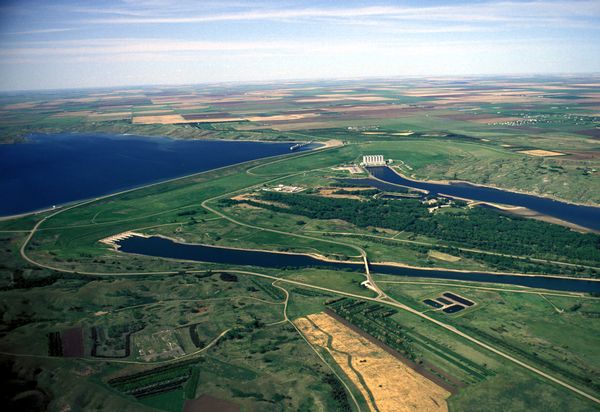Pace’s Prospective On The Dakota Access Pipeline

Lake Oahe, where DAPL’s construction was set to take place. Photo courtesy of http://sdmissouririver.com
After months of protesting from enviormental activists, Native Americans, and United States Army veterans, work on the Dakota Access Pipeline (DAPL) was denied easement to drill by Army Corps of Engineers on Dec. 4, while they explore alternative routes, halting its construction until future notice.
Protests occurred from April onward after the last section of DAPL was planned to be built under the Lake Oahe, which would disturb the Native American Standing Rock Sioux Reservation Tribe’s sacred burial grounds, as well as put their drinking water at risk of being contaminated by oil according to the tribe.
“The body of water under which the pipeline will traverse is very close to [the tribe’s] land, if something goes wrong their land will be affected, and obviously the oil isn’t just going to stay in one spot, it’s going to move and drinking water will be affected,” Director of Pace Academy for Applied Environmental Studies Michelle Land said. “They didn’t have to get their permission since it’s adjacent to [their land], but the right thing to do would be to engage them.”
Easement to drill was denied two days after approximately 3,000 veterans joined protesters, who they saw as being abused when law enforcement sprayed with them mace and blasted with cold water guns.
Pace sophomore, Native American, and Marine Corps Veteran Dayvon Smith said he supports his fellow veterans for pushing back against an abusive government.
“As a veteran, I swore and oath to protect this land [against threats] foreign and domestic, whether that be fighting ISIS overseas or a group of police officers with water guns and tear gas in order to keep the land sacred, that’s technically not our land,” Smith said.
Smith also said that the way the government has handled the protests is similar to the Civil Rights Movement.
“There is no reason it should get to the point where people are getting [sprayed with mace] and water gunned at freezing temperatures with no possible threat,” Smith said. “If you look at the photos from [Standing Rock] and you look at the photos from the time of the Civil Rights Movement, it looks kind of the same. So it’s like ‘are we taking steps forward, or are we taking steps backward?’”
Smith questioned why the government would be fine with an initiative that could hurt Native Americans after the United States’ abusive history with them.
“As a veteran, the first question that pops into my head is ‘who is in charge, who decided to make this decision?’” Smith said. “Looking back at history, don’t you think enough has been done.”
Former Environmental Policy Clinic student and Pace alumna Jessica Alba said that the $3.8 billion spent on DAPL should have been put towards green energy initiatives since she feels that the fossil fuel industry will become obsolete.
“The money spent on pipelines could be better used for creating and implementing renewable sources of energy, which would be better for literally the whole planet, including people, the environment, and the economy,” Alba said.
Land questioned why the pipeline initially did not undergo a review by the National Environmental Policy Act (NAPA) since federal projects are supposed to be reviewed when they might significantly impact the environment.
“[NAPA asks the government to] stop, think about it, let’s look at all the alternatives and decide ‘is this the only way to do it or is there a better way, a different way.’ NAPA doesn’t usually completely stop a project, but it makes the project better,” Land said.
Land fears that once the protests no longer have the attention of the media the pipeline construction will be restarted.
Land also fears that President-elect Donald Trump and his choice to lead the Environmental Policy Agency [EPA] Scott Pruitt, who is a climate change denier, may push for DAPL completion. She has faith, however, that professionals who spent their entire careers in the EPA will serve to protect the environment from Trump’s administration.
“It’s only the [Presidential administration] that comes and goes, career EPA professionals can do a lot to screw up what the administration wants. They can slow things, not get things done, they can wait it out and make it hard for his agenda to get accomplished,” Land said.
Your donation supports independent, student-run journalism at Pace University. Support the Pace Chronicle to help cover publishing costs.
